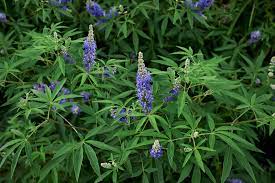Growing Guide and Health Benefits of Fenugreek Seeds
Fenugreek seeds are small, golden-brown seeds that come from a plant known as Trigonella foenum-graecum. These seeds have been used for centuries in various cultures for both culinary and medicinal purposes. They have a distinct flavor and a plethora of health benefits.
In cooking, fenugreek seeds are a common spice used in Indian, Middle Eastern, and Mediterranean cuisines. They add a unique, slightly bitter taste and aroma to dishes. Fenugreek seeds are often found in curries, stews, and pickles. Some people even use them as a spice in their homemade bread.
It is very important to note that while fenugreek seeds offer these potential benefits, they should be consumed in moderation as part of a balanced diet. Excessive intake may lead to side effects, including digestive discomfort.
In addition, fenugreek seeds are not just a flavorful addition to your kitchen but also a source of potential health advantages. Whether you use them to enhance the taste of your dishes or explore their medicinal properties, these small seeds have earned their place in the world of herbs and spices.
Read Also: Significance And Uses of Craspedia Flower
How to Grow Fenugreek Seeds
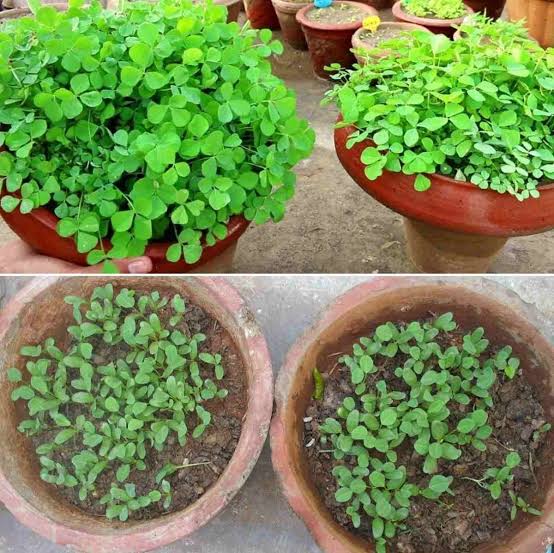
Growing fenugreek seeds at home is relatively simple, and it’s a rewarding way to have fresh fenugreek leaves and seeds for culinary and medicinal purposes. Here’s a step-by-step guide on how to grow fenugreek seeds:
Materials Needed; Fenugreek seeds, Pot or container with drainage holes (if growing indoors), Garden bed or outdoor container (if growing outdoors), Potting soil or well-draining garden soil, Watering can or hose, Sunlight
Steps to Grow Fenugreek Seeds
1. Select the Right Location: Fenugreek thrives in full sun but can tolerate partial shade. Choose a sunny spot for outdoor planting or ensure your indoor location receives ample sunlight, preferably 6-8 hours a day.
2. Choose the Right Container (if growing indoors): If you’re growing fenugreek indoors, select a pot or container with drainage holes to prevent waterlogged soil. Make sure it’s at least 6-8 inches deep to accommodate the plant’s root system.
3. Prepare the Soil: Fenugreek prefers well-draining soil with a slightly acidic to neutral pH (around 6.0 to 7.0). You can use potting mix for containers or amend your garden soil with compost to improve drainage.
4. Sow the Seeds: Plant fenugreek seeds about 1/4 inch deep in the soil or sprinkle them evenly across the planting area. Space them about 2-3 inches apart to allow room for growth.
5. Water Thoroughly: After planting, water the soil well to ensure good seed-to-soil contact. Keep the soil consistently moist but not waterlogged. Fenugreek prefers even moisture.
6. Thin the Seedlings (if necessary): Once the seedlings emerge and have a couple of leaves, thin them to maintain proper spacing. Leave the strongest seedlings with enough room to grow.
7. Fertilize (optional): Fenugreek doesn’t typically require a lot of fertilizer. However, you can use a balanced, all-purpose fertilizer sparingly during the growing season if your soil lacks nutrients.
8. Harvest the Leaves: Fenugreek leaves can be harvested once they are large enough to use in cooking. Snip them at the base of the stem, and the plant will continue to produce more leaves.
9. Harvest the Seeds: To harvest fenugreek seeds, you’ll need to wait until the plant has gone to seed. This usually occurs in the late summer or early fall. The seeds will turn brown and hard. Cut the seed pods from the plant and let them dry further indoors.
10. Store the Seeds: Once the seeds are completely dry, remove them from the pods. Store them in an airtight container in a cool, dark place. Properly stored fenugreek seeds can last for several months.
11. Replant (optional): If you want to continue growing fenugreek, you can collect seeds from your plants and replant them in the next growing season.
By following these steps, you can successfully grow fenugreek seeds at home, whether you choose to cultivate them indoors in a pot or outdoors in your garden. Enjoy the fresh leaves in your dishes and save the seeds for future plantings or culinary use.
15 Health Benefits of Fenugreek Seeds
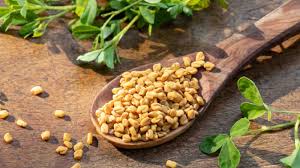
Fenugreek seeds are renowned for their health benefits. Here are 15 of these health benefits:
1. Blood Sugar Regulation: Fenugreek seeds can help control blood sugar levels, making them beneficial for individuals with diabetes.
2. Digestive Health: They aid in digestion, relieving issues like indigestion and constipation due to their high fiber content.
3. Heart Health: These seeds can lower cholesterol levels, reducing the risk of heart diseases.
4. Weight Management: Fenugreek seeds can assist in weight loss by promoting a feeling of fullness and boosting metabolism.
5. Breast Milk Production: They are known to increase breast milk production in nursing mothers.
6. Anti-Inflammatory: Fenugreek seeds possess anti-inflammatory properties, potentially helping with conditions like arthritis and asthma.
7. Skin Health: Topical applications of fenugreek can improve skin health and treat conditions like acne and eczema.
8. Hair Care: They strengthen hair, reducing dandruff and hair loss when used in hair masks or oil treatments.
9. Antioxidant Properties: Rich in antioxidants, fenugreek seeds combat free radicals and slow down the aging process.
10. Respiratory Health: Fenugreek can help relieve respiratory issues, such as coughs and bronchitis.
11. Menstrual Relief: These seeds may ease menstrual discomfort and regulate menstrual cycles.
12. Anti-Cancer Potential: Some studies suggest that fenugreek seeds may have cancer-fighting properties.
13. Bone Health: They contain minerals like calcium and phosphorus, promoting healthy bones.
14. Appetite Control: Fenugreek seeds can help control appetite and reduce overeating.
15. Liver Health: They support liver function and aid in detoxification processes.
Incorporating fenugreek seeds into your diet or skincare routine can offer these potential health benefits, but it’s essential to consume them in moderation and consult with a healthcare professional, especially if you have specific health concerns or conditions.
Read Also: Significance And Uses of Zantedeschia Aethiopica Flower
Uses of Fenugreek Seeds
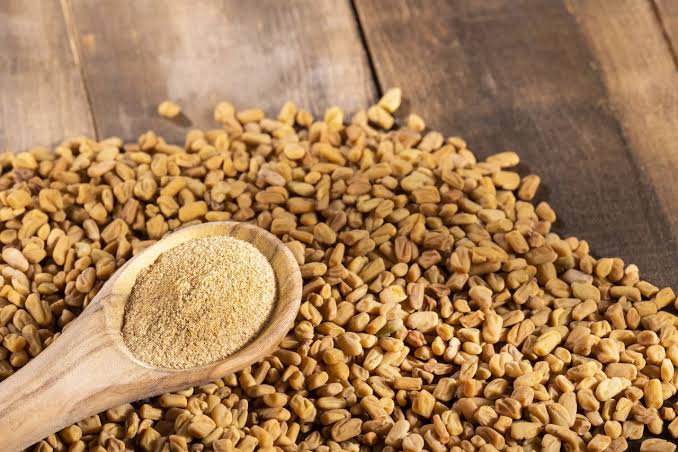
Fenugreek seeds have a wide range of uses, both culinary and medicinal. Here are some common applications:
1. Cooking: Fenugreek seeds are a popular spice in Indian, Middle Eastern, and Mediterranean cuisines. They add a unique flavor to dishes, often described as slightly bitter with a hint of maple. They are used in curries, spice blends, pickles, and as a flavoring in various dishes.
2. Spice Blends: Fenugreek seeds are a key ingredient in spice blends like curry powder and garam masala, contributing to the complex and aromatic flavors of these mixtures.
3. Baking: In some regions, fenugreek seeds are used in bread-making, particularly in traditional flatbreads like naan.
4. Tea: Fenugreek seeds can be steeped to make herbal tea. This tea is often consumed for its potential health benefits, including aiding digestion and regulating blood sugar levels.
5. Sprouting: Fenugreek seeds can be sprouted and added to salads and sandwiches, offering a fresh and slightly nutty flavor.
6. Medicinal Remedies: Fenugreek seeds have been used in traditional medicine for various purposes, such as alleviating digestive issues, reducing inflammation, and promoting milk production in nursing mothers.
7. Hair Care: Fenugreek seeds can be soaked and ground into a paste, which is applied to the hair and scalp. This treatment is believed to strengthen hair, reduce dandruff, and promote hair growth.
8. Skin Care: Similarly, fenugreek seed paste can be used as a face mask to improve skin health, treat acne, and soothe skin irritations.
9. Supplements: Fenugreek seed extracts and supplements are available in various forms, including capsules and powders, for those looking to benefit from their potential health advantages.
10. Flavor Enhancer: Ground fenugreek seeds can be used as a seasoning to enhance the taste of soups, stews, and sauces.
11. Herbal Medicine: Fenugreek seeds have been used in herbal medicine for their potential to help with conditions like diabetes, high cholesterol, and digestive problems.
12. Flavoring Agent: Fenugreek seeds are sometimes used to add a unique taste to pickles, chutneys, and spice rubs for meats.
13. Breastfeeding: Fenugreek seeds are known to increase breast milk production and are often recommended to nursing mothers.
14. Aromatherapy: Fenugreek essential oil, derived from the seeds, is used in aromatherapy for its soothing and relaxing qualities.
15. Cosmetics: Fenugreek extracts may be used in cosmetics and skincare products for their potential skin-rejuvenating properties.
These versatile seeds offer a wide array of uses in both the culinary and wellness worlds, making them a valuable ingredient for various purposes. However, it’s essential to use fenugreek seeds in moderation and consult with a healthcare professional if considering them for medicinal purposes.
Fenugreek Leaves
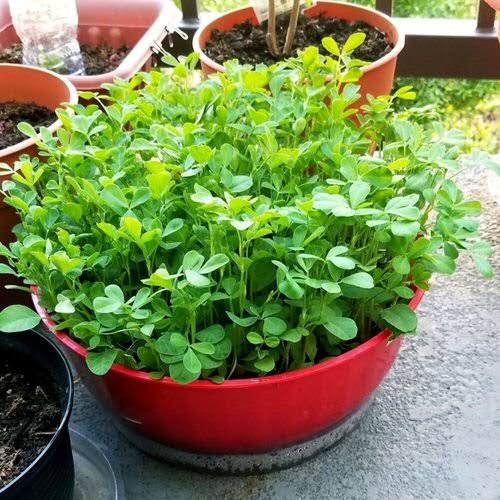
Fenugreek leaves, also known as “methi” in Hindi, are a delightful and nutritious addition to our culinary world. These tender green leaves come from the fenugreek plant, which is widely cultivated in various parts of the world. Fenugreek leaves have long been cherished not only for their distinct flavor but also for their numerous health benefits.
Fenugreek leaves have a unique taste that can be described as slightly bitter with a hint of sweetness. They are commonly used in Indian and Middle Eastern cuisines, where they add a rich and earthy flavor to a wide range of dishes. One of the most popular ways to enjoy fenugreek leaves is by incorporating them into various curries, stir-fries, and rice dishes.
One of the standout qualities of fenugreek leaves is their impressive nutritional profile. These leaves are a rich source of essential vitamins and minerals, making them a valuable addition to a balanced diet. They are particularly high in vitamin A, vitamin C, and vitamin K, all of which play crucial roles in maintaining good health.
In addition to vitamins, fenugreek leaves are also abundant in dietary fiber. Fiber is essential for a healthy digestive system, and fenugreek leaves provide a good dose of it. Including these leaves in your diet can help regulate bowel movements and prevent constipation.
Fenugreek leaves are also known for their potential health benefits. Some studies suggest that they may help in regulating blood sugar levels, which can be beneficial for individuals with diabetes. Moreover, fenugreek leaves have been traditionally used to boost lactation in nursing mothers, making them an important part of postpartum nutrition in many cultures.
Cooking with fenugreek leaves is a straightforward process. You can wash the leaves thoroughly and chop them finely to add to your favorite dishes. They pair exceptionally well with other vegetables, legumes, and spices. A classic Indian dish that showcases the versatility of fenugreek leaves is “methi aloo,” where the leaves are sautéed with potatoes and spices to create a delectable side dish.
Apart from their culinary and health benefits, fenugreek leaves also have a place in traditional herbal medicine. They have been used for centuries to treat a variety of ailments, including digestive issues, respiratory problems, and skin conditions. However, it’s important to consult a healthcare professional before using fenugreek leaves for medicinal purposes, as their effectiveness and safety can vary from person to person.
However, fenugreek leaves are a culinary gem that brings a unique flavor and a plethora of health benefits to the table. Whether you enjoy them in a spicy curry or a simple stir-fry, these leaves are sure to delight your taste buds and contribute to your overall well-being. So, don’t hesitate to explore the world of fenugreek leaves and discover the wonderful flavors and advantages they have to offer.
Fenugreek Powder
Fenugreek powder is a versatile and aromatic spice that originates from the fenugreek plant’s seeds. This finely ground powder has found its way into kitchens around the world, adding a distinctive flavor and numerous health benefits to a wide range of dishes.
The process of making fenugreek powder involves drying and grinding the fenugreek seeds into a fine, golden-brown powder. This powder is commonly used as a spice in cooking, especially in Indian, Middle Eastern, and Mediterranean cuisines. It imparts a slightly sweet and nutty flavor with a hint of bitterness, making it a key ingredient in various culinary creations.
One of the most popular uses of fenugreek powder is in curry blends. It contributes to the complex and robust flavors of curry dishes, enhancing their depth and aroma. Additionally, fenugreek powder is a crucial component of many spice blends, such as garam masala and berbere, which are used to season a wide array of recipes.
Beyond its culinary applications, fenugreek powder is renowned for its potential health benefits. It has been used in traditional medicine systems for centuries to address various health concerns.
In summary, fenugreek powder is a spice with a rich history in both culinary and medicinal traditions. Its distinctive flavor and potential health benefits make it a valuable addition to your kitchen pantry. Whether you’re looking to elevate the taste of your dishes or explore its potential wellness advantages, fenugreek powder is a versatile and aromatic ingredient that can enhance your culinary and health journey.
Read Also: The Impact of Inhaler Disposal on Our Environment



